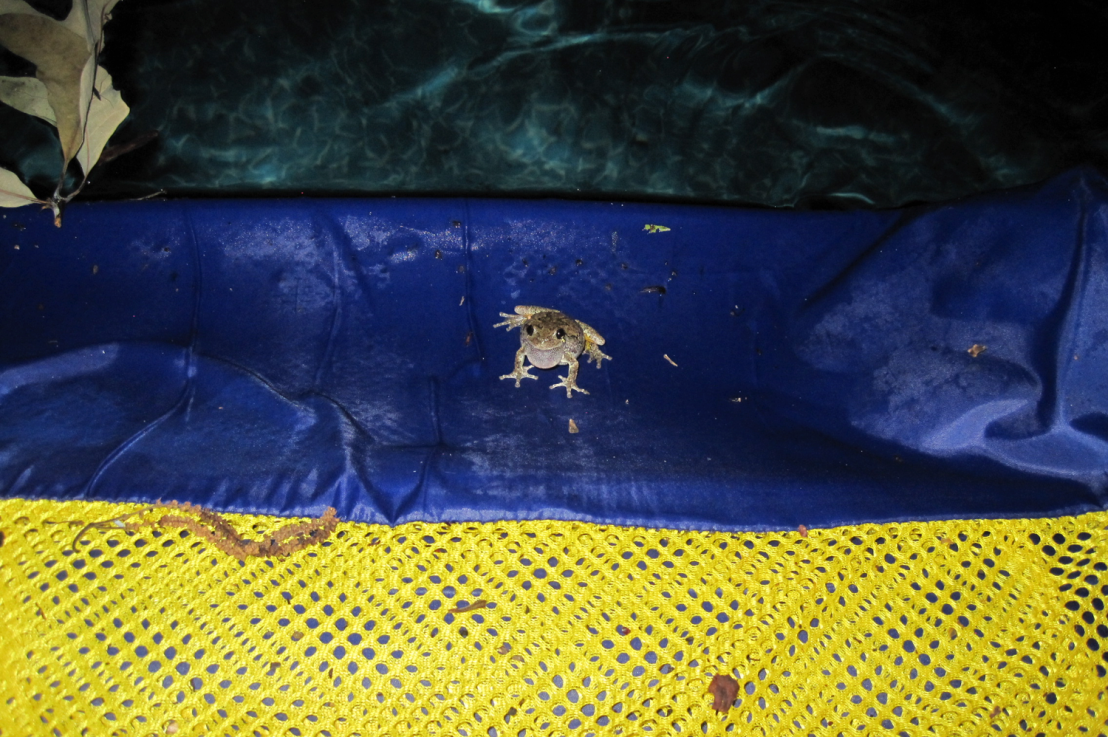An ecological trap is a situation that may seem appealing to organisms, but that is actually detrimental to them. The situation that made me think of this tonight is the intense mate-calling of frogs in our backyard. We have a swimming pool in our backyard. We put a cover over it in the winter to prevent leaves and gumballs (from the sweet gum tree) from accumulating in it over the winter. Then in the spring, we scoop all the leaves and gumballs off the cover and remove the cover to “open” the pool. It’s easier to scoop the leaves and gumballs off the cover than it is to try to scoop them out of the bottom of the pool.
This year, I don’t know if we were a bit late or if the frogs were a bit early, but frogs began laying eggs in the water on top of the pool cover before we had gotten a chance to remove it. All of a sudden, it seemed, there were hundreds of tiny tadpoles in the water on the pool cover. While we typically have no problem draining the insects from the pool cover to their deaths in the terrestrial habitat of the back yard, we couldn’t fathom killing literally hundreds of vertebrates– the tadpoles. So, to make a long story short, over a period of a few weeks, we removed overall a grand total of a few thousand tadpoles and transported them to a nearby pond to complete their little froggie lives. Then we removed the pool cover. End of story, right?
Well, I had thought so. These are grey tree frogs, and they typically lay their eggs in still water. Our pool filter is constantly moving the water, so it doesn’t qualify as “still water”. To me, at least. Do insects lay their eggs in our swimming pool? We have observed dragonfly mating in the pool area and it is possible that they lay eggs in our pool. But if they do, the eggs would get sucked into the pool’s filter and cease to exist. I’m certainly fine with that happening to any mosquito eggs that may be laid in the pool. What about dragonflies? They’re more “charismatic” than mosquitos… And what about frogs, which are fellow vertebrates, after all– a characteristic that for some reason makes us more willing to empathize…
So, this evening, the frogs in our backyard were calling at a decibel level topping 80 at times. There were a half dozen frogs that I could easily see around the pool, and more calling that I couldn’t see. I watched as a female selected the male calling from the raft we leave in the pool as a “life-saving device” for critters that may fall in. I guess, actually being *in* the pool made him the king of the area. Amplexus occurred, but then I watched at the female, with the male on her back, swam half the length of the pool, climbed out (with the male still hanging on), and disappeared into the night without releasing eggs. There is no other body of standing water within at least a few hundred yards, so it seems that this mating encounter was fruitless.

So, is our pool, and are other suburban pools, an ecological trap? The presence of the swimming pool as a water body lures the frogs into thinking it’s adequate mating habitat. The males expend a good deal of time and energy calling for mates and defending territories where their offspring will never be produced. The females seek out mates and carry them around for a while but, if eggs are laid, they are surely sucked into the pool’s filtration system and never hatch– thus no offspring will result from their efforts. This would be the same for dragonflies, mosquitoes, and any other organisms trying to lay their eggs in water.
I propose that backyard swimming pools are a substantial ecological trap, contributing to the recent and significant declines in populations of amphibians and insects with aquatic larval stages. A quick search on Google Scholar revealed zero hits for papers on “swimming pool” and “ecological trap”. Think I could get funding to study this? 😉

